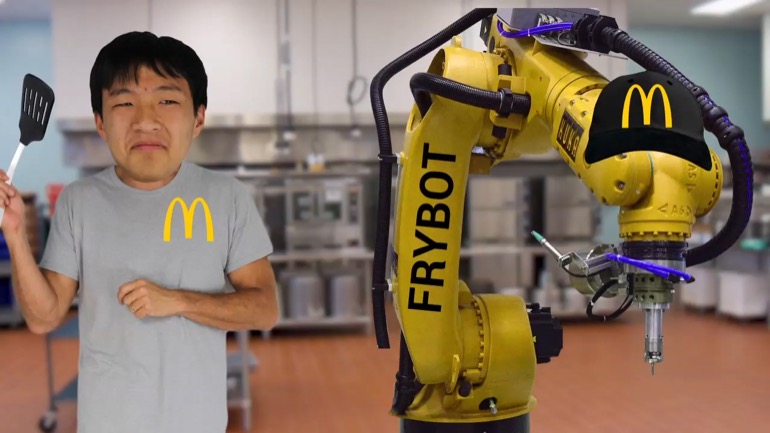ShmoopTube
Where Monty Python meets your 10th grade teacher.
Search Thousands of Shmoop Videos
Econ Videos 79 videos
What is a Production Possibilities Curve? The Production Possibilities Frontier Curve (PPF) is a statistical graphic curve that depicts the compari...
What are Income and Substitution Effects? Income effects reflects the increases or decreases in total consumption of goods and services in proporti...
How Do Companies Add Value? Companies add value by improving the client or customer experience. This can be achieved by offering better quality ser...
Econ: What is Human Capital? 3 Views
Share It!
Description:
What is Human Capital? Human capital refers to the ascribing of a return on investment calculation of an employee’s skills sets, experience, and other abilities, which may or may not be tangible, but can be quantified as contributing to a company’s bottom line.
Transcript
- 00:00
And finance Allah shmoop What is human capital Oh well
- 00:07
for firms or companies or businesses you know Capitol the
- 00:11
material stuff that financial investors or capital issues You know
- 00:16
in the long run to make a factors of production
- 00:19
In order to make money like that tractor smelting factory
Full Transcript
- 00:22
or buying a whole bunch of property Teo grow lucky
- 00:25
charms on and then sell them in boxes for a
- 00:27
big profit right It's patents and all that kind of
- 00:29
stuff That's just capital that's non human capital The missing
- 00:32
ingredient to this capital pie Yes human capital That's what
- 00:36
we're talking about here Somebody's got to tell these machines
- 00:39
what to dio for now at least until a I
- 00:42
and robots replace us well Human capital is the value
- 00:45
that workers can bring to their employers It's the economic
- 00:48
value potential a worker has given all their knowledge their
- 00:51
experience and their particular skill set above and beyond what
- 00:54
a machine could do to replace him for free Well
- 00:56
different jobs require different kinds of human capital Restaurant servers
- 01:00
need to be able to hold inordinate amounts of plates
- 01:03
on their arms while you know putting on a smile
- 01:05
Data analyst need to know lots about math and know
- 01:08
how to use spreadsheets and interpret all this weird stuff
- 01:11
Are these numbers construction workers need to know howto work
- 01:14
the equipment pour concrete and whistle crudely yet well hot
- 01:18
looking people passing by the site Middle school teachers need
- 01:21
to be part teacher part baby sitter and particle disciplinarians
- 01:25
depending on which ones you asked Everyone who has a
- 01:28
job is in some way using their human capital which
- 01:31
contributes to their employer into the economy as a whole
- 01:34
Human capital isn't fixed not as in it was broken
- 01:38
With Mohr Education comes more human capital right If people
- 01:41
are underemployed meaning there overqualified for the job it means
- 01:46
there's human capital being left on the table unused like
- 01:49
a phD being a sex worker something like that Or
- 01:53
for instance a train JJ neuroscientist who's working as a
- 01:57
sandwich artist at subway well has a lot of human
- 01:59
capital that's not being utilized resulting in a loss of
- 02:02
value for the economy Albeit Cem expertly assembled tuna wraps
- 02:06
Well the interesting thing about human capital is well how
- 02:09
it relates to technology It's a frenemy like friend and
- 02:12
enemy As our human capitals grown as a society so
- 02:15
too has our technology and certainly our capability of deploying
- 02:19
it Advanced human capital has allowed us to create all
- 02:21
kinds of crazy advanced tech And yet now technology is
- 02:25
beginning to replace the need for human capital from flipping
- 02:28
burgers and driving cars to creating music and writing news
- 02:31
articles It's increasingly common that robots we've made are replacing
- 02:35
the need for us their makers Human capital is being
- 02:38
replaced by capitalist with technological capital which makes sense if
- 02:44
they could do the job right Robots aren't late toe
- 02:46
work They don't ate their bosses They don't spit on
- 02:49
the food and they don't shed hair and skin all
- 02:52
over the place It makes sense for the trend of
- 02:54
technological capital to continue replacing human capital If the pros
- 02:58
outweigh the cons right well that's problem since workers need
- 03:02
human capital in orderto work Otherwise they've got nothing to
- 03:05
offer the economy and they can't get a job And
- 03:08
if a lot of people can't get jobs a lot
- 03:09
of people won't be spending money which I would kind
- 03:11
of put a damper on the economy If all else
- 03:13
fails Maybe the robots will just take care of the
- 03:15
problem for us How about that You know one way 00:03:18.548 --> [endTime] or another
Related Videos
GED Social Studies 1.1 Civics and Government
What is bankruptcy? Deadbeats who can't pay their bills declare bankruptcy. Either they borrowed too much money, or the business fell apart. They t...
What's a dividend? At will, the board of directors can pay a dividend on common stock. Usually, that payout is some percentage less than 100 of ear...
How are risk and reward related? Take more risk, expect more reward. A lottery ticket might be worth a billion dollars, but if the odds are one in...



















































































